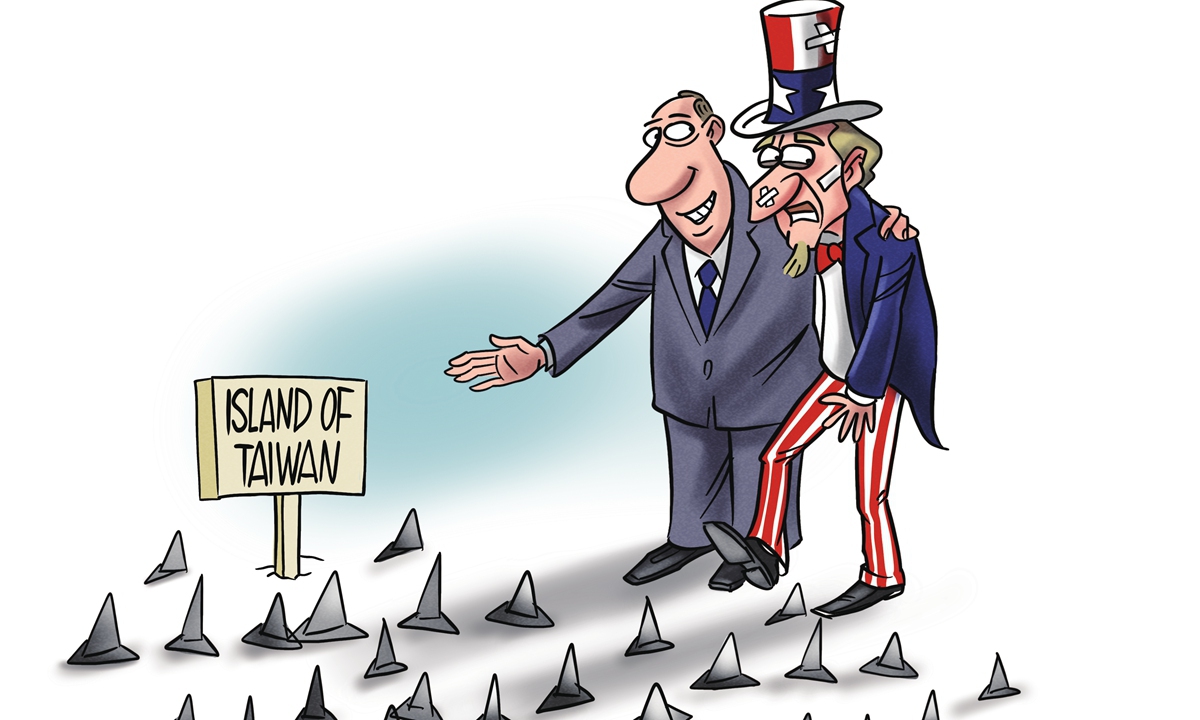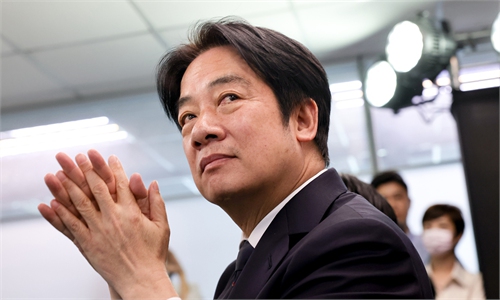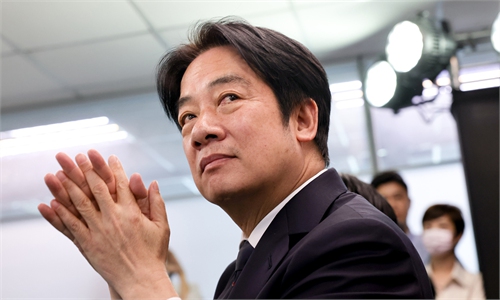If US sees China as No.1 competitor, China must have the power to match the label

Illustration: Liu Rui/GT
A poll released Wednesday shows that "a majority of American respondents said the US needs to increase preparations for potential military threats from China," though only 38 percent of them said they would "support deploying US troops to Taiwan in the case of a Chinese attack," which is seen as putting political constraints on US leaders, preventing them from making risky choices.The US has maintained a strategic ambiguity on whether to intervene militarily in Taiwan question, but there are signs that Washington is gradually moving away from the possibility of sending US troops to fight in the event of a war in the Taiwan Straits. US President Joe Biden has said several times that the US would "defend Taiwan" militarily, but the White House has walked back Biden's statement by claiming that the US policy on the Taiwan Straits "has not changed," and Biden's claim is widely regarded as a "trick" in the public opinion war. The US is making more efforts to arm Taiwan island and turn it into a "porcupine," and it is viewed as a move by the US to make Taiwan "defend itself."
All the involvement of the US side in the Taiwan question, including arms sales to Taiwan island, training of the Taiwan local army and the threat of sanctions are all resolutely opposed by Beijing, yet the US showed signs of backing down on the direct military intervention. The Democratic Progressive Party (DPP) authority is screaming in a high morale, yet once they are convinced that the US will not send troops, their will to resist reunification will fall off by a large margin, or even collapse abruptly at the critical moment, and their previous clamor is more of a bluff.
The reason why the US is getting more and more hesitate toward direct military intervention in the Taiwan Straits, is fundamentally because that the military strength on the two sides of the Taiwan Straits has undergone a historic change. Taiwan island's military is vulnerable in front of the rapidly rising Chinese mainland, and the US military deployment in the nearby waters of China in the Western Pacific region is no match of China's conventional military forces, while US' nuclear deterrence against China has basically been dismantled by the Chinese mainland. China needs to further consolidate this trend, to make the US society, including US elites, become more fearful about the military intervention in Taiwan question. Ultimately, it will become a fairly certain anticipation in the world that the US will not dare to send troops to the Taiwan Straits.
In order to further promote this trend, China needs to make the world, and above all, the Americans, recognize several irreversible changes. First, China is capable of routing and heavily beating incoming US forces in the Taiwan Straits and South China Sea, and the combined firepower of our naval and air forces plus our shore-based rocket forces can unquestionably bring about unbearable losses to the US. Second, China has sufficient long-range air and rocket force to destroy all US military bases in the Asia-Pacific that serves possible wars. Third, China, with ample secondary nuclear strike capability and firm will to use this power if necessary, would be able to effectively curb the US' impulse and ambition to apply nuclear weapons in the event that it loses its conventional combat capability in the Western Pacific.
China needs to constantly demonstrate these three capabilities to the outside world in a moderate manner and intensity, and make sure that it is noticed by the American mainstream society and will attract their attention. There were American scholars who once tried to demonstrate that "the US can destroy all of Russia's long-range nuclear systems in a first strike." At the time, some US presidential contenders didn't even know that China was a nuclear power. Our military forces, including our nuclear forces, were once despised by the US, and the failure of these forces to participate in shaping American society's dispassionate attitudes around the China issue needs to be fundamentally changed.
We can no longer expect the US elites and the brainwashed people to "like" or "appreciate" China, they have regarded us as the No.1 strategic competitor. We must have the power to match this label. The US elites can "hate" China, but they must at the same time fear China. This is the basic condition for China to realize the strategic balance in the new situation and to explore a new model of peaceful coexistence between China and the US.
However, I don't mean to encourage China to go to war with the US. To the contrary, I advocate the creation of a reliable environment and conditions for China and the US to avoid military conflict. China's will for peace should be fully expressed, our determination to defend our core interests at all costs should be fully demonstrated and China's bottom line should be as clear as possible to prevent the US from hallucinating and misjudging. The Taiwan question is China's internal affair, and China will strive to achieve reunification by peaceful means, but if the forces of Taiwan independence get carried away then we will have to resort to force. The US must know that it needs to accept China's way of dealing with this issue because that is, in fact, the only option available to the US.
The author is a Chinese media professional. opinion@globaltimes.com.cn



